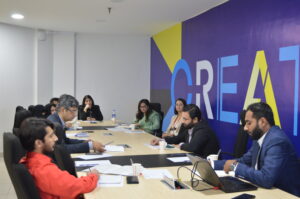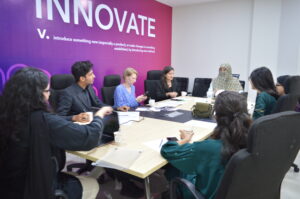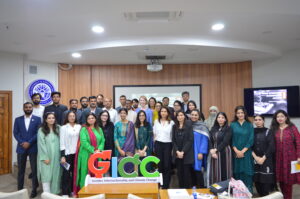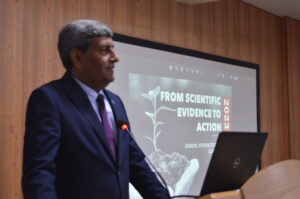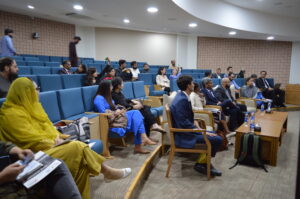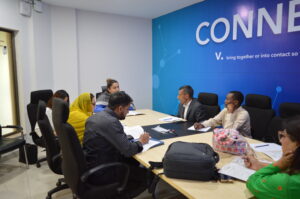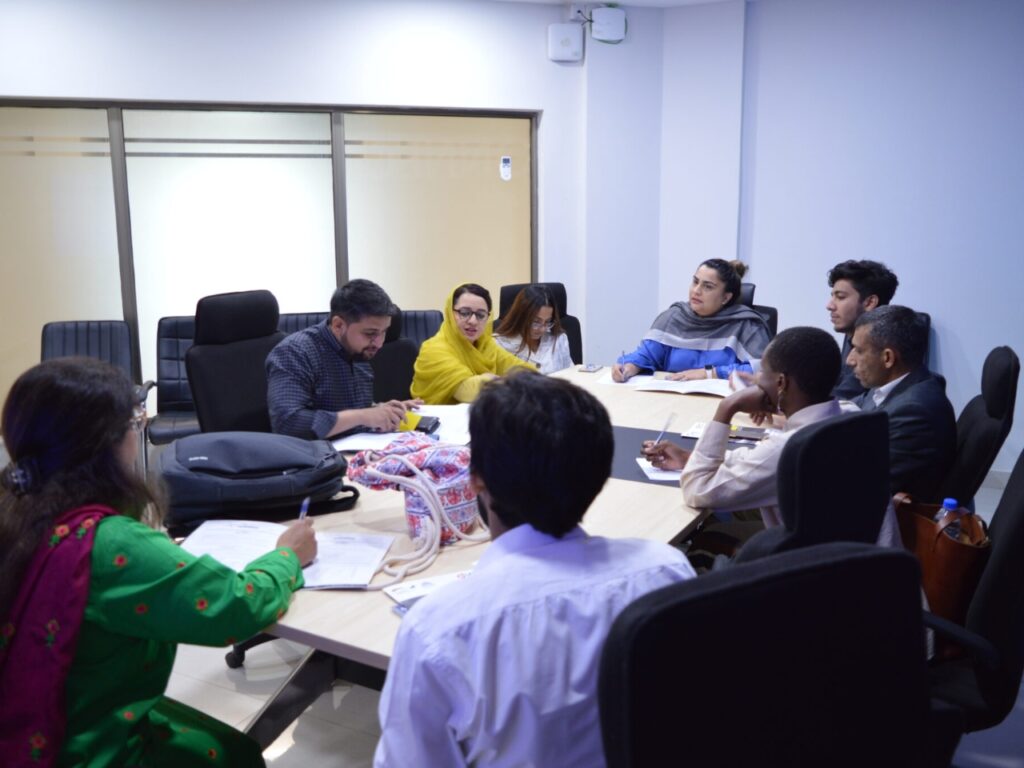
The Roundtable Discussion, held on October 31, 2023, at the National University of Sciences and Technology (NUST), Sector H-12, Islamabad, Pakistan, successfully shaped the agenda for the upcoming International Conference in 2024. This research program, a joint venture between NUST and the German Federal Ministry for Economic Cooperation and Development (BMZ), supported by the Deutsche Gesellschaft für Internationale Zusammenarbeit (GIZ) GmbH, facilitated in-depth discussions on diverse themes related to Climate Change. Key topics included Gender, Intersectionality & Climate Change Governance; Gender, Intersectionality & [Pre, During & Post] Disaster Risk Reduction (DRR); and Gender-oriented socio-demographic factors for Climate Change Adaptation. These themes were finalized during the discussion, setting the stage for the call for abstracts, poster sessions, and photo competition to be presented at the 2024 International Conference. The insights shared during the Roundtable Discussion were instrumental in ensuring the conference’s agenda is comprehensive and impactful.
ROUNDTABLE DISCUSSION: GENDER, INTERSECTIONALITY AND CLIMATE CHANGE
Venue and Date of the Event
The roundtable discussion was held on 31st October 2023 at the National Science and Technology Park (NSTP), located at the National University of Sciences and Technology (NUST), Islamabad, Pakistan. This venue provided an ideal setting for gathering experts and practitioners to engage in meaningful discussions on gender, intersectionality, and climate change.
Purpose and Significance
The Roundtable Discussion on Gender, Intersectionality, and Climate Change was a pre-conference activity aimed to gather insights on key sub-themes for the upcoming conference. Bringing together development practitioners, university faculty, and researchers, the discussion provided a platform to explore the intersection of gender and climate change across three main areas: governance, disaster risk reduction, and socio-demographic factors for adaptation. By engaging experts in focused breakout sessions, the roundtable helped refine the conference’s thematic focus, ensuring that the discussions would address critical issues in gender-inclusive climate policies and solutions.
Overview
The discussion followed a dynamic format, with a brief intro
duction to the program and the three broader thematic areas. The audience was then split into three breakout sessions to further deliberate on the sub-themes within the three areas. The sessions were as follows:
1. Breakout Session 1: Gender, Intersectionality, and Climate Change Governance, moderated by Dr. Rabia Zaid, Assistant Professor School of Social Sciences & Humanities, NUST
2. Breakout Session 2: Disaster Risk Reduction, moderated by Dr. Wajiha Haq, Assistant Professor School of Social Sciences & Humanities, NUST
3. Breakout Theme 3: Gender-oriented Socio-demographic Factors for Climate Change Adaptation, moderated by Dr. Sumara Masood, Assistant Professor School of Social Sciences & Humanities, NUST
Summary of Discussions
I: Gender, Intersectionality, and Climate Change Governance
The participants in the discussion emphasized several key points regarding gender-responsive climate action. They stressed the crucial role of accountability and transparency mechanisms in reporting gender-related progress, including addressing discrimination complaints and holding all stakeholders accountable for their actions. They also highlighted the challenges in implementing gender-responsive policies due to their complexity, which often hinders effectiveness in implementation. The participants talked about the importance of promoting evidence-based decision-making by using gender-based data to inform climate action policies and programs, ensuring the inclusion of women and marginalized groups’ experiences. They also focused on promoting positive masculinity by raising awareness about the harmful effects of traditional masculinity and advocating for positive alternatives through various strategies such as public education campaigns and media engagement. They acknowledged the significance of media outlets partnering with women’s organizations and experts to ensure accurate and representative coverage of gender and climate change. Following this, they emphasized the need for media outlets to advocate for gender-inclusive policies supporting women’s participation in climate action, including providing education, training, and leadership opportunities. They also discussed the importance of allocating sustainable funding for gender-responsive climate action to ensure continuity and the necessity of promoting local ownership and leadership in climate change initiatives, empowering local communities to take initiative and manage project implementation.
II: Disaster Risk Reduction
The key points of discussion were categorized into three main areas including pre-disaster, during the disaster, and post-disaster. In the pre-disaster phase, participants emphasized the need for effective mitigation of threats through concrete actions that should be outlined in risk reduction plans. They stressed the importance of conducting localized climate risk assessments to understand specific challenges and vulnerabilities at the local level. Additionally, they highlighted the significance of community sensitization and awareness-raising about disaster-related issues, emphasizing long-term consequences and community engagement. The participants also noted regional disparities in disaster risk reduction policies as well as the necessity of tailoring policies to address the needs of specific areas and communities. They also recognized the importance of assessing unique vulnerabilities and risks within different communities to design more effective disaster risk reduction plans.
During the disaster phase, participants highlighted the challenge of resource scarcity in disaster risk reduction efforts and the difficulties in engaging communities due to language and cultural barriers. Both raising awareness and implementing practical solutions are crucial and there is a need to bridge the gap between policy and on-the-ground action. The participants also highlighted the vulnerability of women in disasters and the importance of understanding this vulnerability
through data. They advocated for gender-specific approaches and indigenous involvement, considering the differences in disaster impacts between urban and rural areas.
In the post-disaster phase, participants emphasized the importance of using evidence-backed data to secure funding and support for disaster risk reduction efforts. They highlighted the need to address the policy implementation gap and improve data quality and localization to effectively inform post-disaster policies and interventions.
III: Gender-oriented Socio-demographic Factors for Climate Change Adaptation
The discussions in the third session brought to light various issues and challenges within this area, pinpointing gaps such as the lack of gender-integrated projects and the absence of quality education and literacy. Participants agreed that the focus needed to be on finding solutions for addressing these gaps. Regarding women in agriculture, participants highlighted the vulnerability of women during crises like agricultural setbacks, emphasizing the importance of recognizing and addressing these challenges to ensure their well-being and empowerment, particularly in the context of sustainable agriculture. The effect of natural disasters on women was emphasized, with discussions covering impacts such as violence, limited access to education and health services, and reduced decision-making power, underscoring the need for measures to mitigate these challenges. The participants also discussed the impact of climate change on women’s employment, wages, and financial independence, advocating for empowering women to share financial burdens and achieve self-sufficiency.
Following this, participants referenced case studies illustrating women’s vulnerability to climate change and the importance of initiatives promoting women’s empowerment and education. Participants stressed the importance of incorporating indigenous knowledge to promote sustainability and gender-responsive climate technology. Discussions also revolved around policy integration, governance challenges, and the importance of gender considerations in climate change policies. The participants closed the session by highlighting areas of concern such as the need for more gender-integrated projects, accessible climate data, and addressing the absence of quality education and literacy. They also explored strategies for managing the policy knowledge gap, emphasizing the importance of understanding the intersection of gender and culture, urban resilience, climate, and reproduction, while suggesting future implementations and solutions to bridge these gaps.
Insights and Recommendations
Since the purpose of the roundtable discussion activity was to gain insights on and improve the existing thematic areas and sub-themes, the following recommendations were included:
For the area of Gender, Intersectionality, and Climate Change Governance, the following two additional sub-themes were proposed:
1. Role of academia in policy implementation regarding gender, intersectionality and climate change
2. Strengthening civil society for climate action in the nexus of gender and intersectionality
For the area of Disaster Risk Reduction, the following two additional sub-themes were proposed:
1. Economic empowerment of women in the nexus of intersectionality and climate change
2. Identifying existing development programs under gender, intersectionality and/or climate change to help women, and gaps in their implementation
For the area of Gender-oriented Socio-demographic Factors for Climate Change Adaptation, the following two additional sub-themes were proposed:
1. Participation of women in sustainable transition, with the backdrop of gender, intersectionality and climate change
2. Climate change and the WPS (women, peace and security) nexus
Following are glimpses of the event held on October 31, 2023, at NUST, Islamabad, where vibrant discussions on Climate Change themes shaped the 2024 International Conference agenda.
